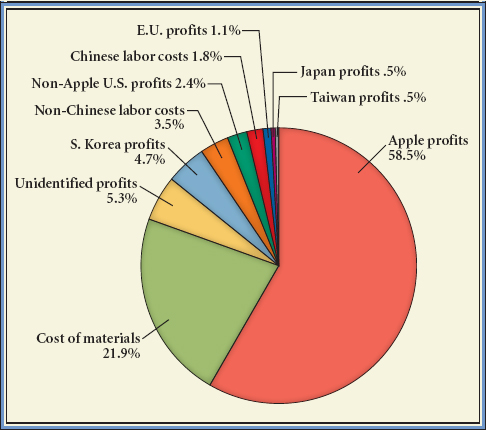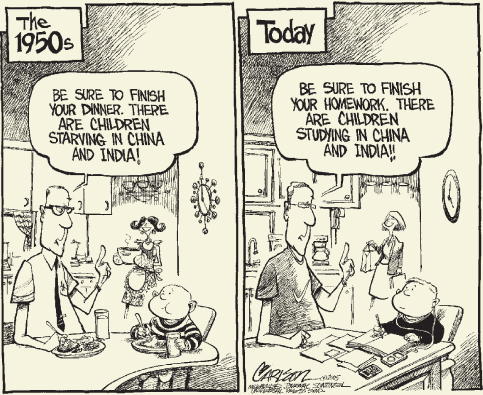America’s History: Printed Page 1006
THINKING LIKE A HISTORIAN |  |
Globalization: Its Proponents and Its Discontents
Globalization is perhaps one of the most commonly used, yet least understood, concepts in our modern vocabulary. This chapter has explored how, while there has long been an international, or global, dimension to trade, migration, and other economic activity, there is nevertheless something distinct about the post-Cold War global order. Economic integration and communication networking have created new opportunities for millions of people. Yet those same processes may not benefit all equally. The following documents offer different perspectives on the broad process called globalization.
Interview with Petra Mata, Mexican immigrant to the United States, 2003. An immigrant from a low-wage country who was “insourced,” Mata worked as a low-paid garment worker until she lost her job in the United States because it was outsourced — sent abroad to workers paid even less.
My name is Petra Mata. I was born in Mexico. I have completed no more than the sixth grade in school. In 1969, my husband and I came to the U.S. believing we would find better opportunities for our children and ourselves. We first arrived without documents, then became legal, and finally became citizens. For years I moved from job to job until I was employed in 1976 by the most popular company in the market, Levi Strauss & Company. I earned $9.73 an hour and also had vacation and sick leave. Levi’s provided me and my family with a stable situation, and in return I was a loyal employee and worked there for fourteen years.
On January 16, 1990, Levi’s closed its plant in San Antonio, Texas, where I had been working, leaving 1,150 workers unemployed, a majority of whom were Mexican-American women. The company moved its factory to Costa Rica. …
As a result of being laid off, I personally lost my house, my method of transportation, and the tranquility of my home. My family and I had to face new problems. My husband was forced to look for a second job on top of the one he already had. He worked from seven in the morning to six at night. Our reality was very difficult. At that time, I had not the slightest idea what free trade was or meant. …
Our governments make agreements behind closed doors without participation from the working persons who are most affected by these decisions — decisions that to my knowledge only benefit large corporations and those in positions of power.
iPhone global supply chain figure, 2011.
 FIGURE 31.2
FIGURE 31.2Seattle Chapter, National Lawyers Guild, “Bringing in an Undemocratic Institution Brings an Undemocratic Response,” 2000.
Many of the businesses that most promote the WTO [World Trade Organization] and its allied institutions rely on undemocratic practices to promote their business interest. In recent years these policies have included not only monopolistic business practices but also outright interference with local governments. Frequently, to promote the interests of business, a militaristic type of government is either promoted, or even created. The effects these governments and their policies have on the citizenry of these nations are disastrous. Farms and forests are ruined and denuded. Low cost toxic waste dumps are created near population centers to service skyrocketing debts. …
The WTO was nominally chartered as a dispute resolution organization. The problem is it is an organization with no real oversight or accountability, and a process that favors the most powerful corporations.
World Trade Organization press release, 2000.
Extreme poverty is a huge problem. 1.2 billion people survive on less than a dollar a day. A further 1.6 billion, more than a quarter of the world’s population, make do with one to two dollars a day.
To alleviate poverty, developing economies need to grow faster, and the poor need to benefit from this growth. Trade can play an important part in reducing poverty, because it boosts economic growth and the poor tend to benefit from that faster growth.
The study finds that, in general, living standards in developing countries are not catching up with those in developed countries. But some developing countries are catching up. What distinguishes them is their openness to trade. The countries that are catching up with rich ones are those that are open to trade; and the more open they are, the faster they are converging.
Stuart Carlson, political cartoon from the Milwaukee Journal-Sentinel, 2005.
 Stuart Carlson © 2005 Milwaukee Sentinel. Reprinted with permission of UNIVERSAL UCLICK. All rights reserved.
Stuart Carlson © 2005 Milwaukee Sentinel. Reprinted with permission of UNIVERSAL UCLICK. All rights reserved.Former president Bill Clinton, speech at Guildhall, London, 2006.
I spent a lot of time working on globalization when I was president, coming to terms with the fundamental fact of interdependence that goes far beyond economics: open border, easy travel, easy immigration, free flow of money as well as people, products, and services. I tried to figure out how to maximize the dynamism of global interdependence and still broaden its impact in terms of economics and opportunity. The one thing that I am quite sure of is that interdependence is not a choice, it’s not a policy, it is the inevitable condition of our time. So, divorce is not an option. …
Therefore, the mission of the moment clearly is to build up the positive and reduce the negative forces of global interdependence in a way that enables us to keep score in the right way. Are people going to be better off, will our children have a better chance, will we be more united than divided?
Sources: (1) From Shafted: Free Trade and America’s Working Poor, by Christine Ahn (Food First Books, 2003). Reprinted by permission of the Institute for Food and Development Policy, 398 60th Street, Oakland, CA 94618.; (2) Kenneth L. Kraemer, Greg Linden, and Jason Dedrick, “Capturing Value in Global Networks: Apple’s iPad and iPhone” (Paul Merage School of Business, University of California, Irvine, July 2011). Used by permission of the authors; (3) Seattle Chapter, National Lawyers Guild, “Bringing in an Undemocratic Institution Brings an Undemocratic Response,” July 5, 2000, ii, 5; (4) WTO press release, June 13, 2000, quoting a WTO Special Study No. 5, “Trade, Income Disparity, and Poverty,” June 2000. Used by permission of the World Trade Organization; (6) collegeofpublicspeaking.co.uk/Clinton-London-2006.html.
ANALYZING THE EVIDENCE
Question
Free trade means that goods can move between countries without restriction or taxation (such as tariffs or duties). Compare sources 1, 3, 5, and 6. How do these different sources explain the effects of freer trade across the globe? How would you interpret the WTO’s optimism about free trade alongside Petra Mata’s personal experience of displacement?
Question
How is increased global communication important to the trade relationships described in source 2? According to source 4, what are some other effects associated with the trade relationships shown here?
Question
What tension in globalization is the cartoonist in source 5 attempting to capture? What kind of change over time has the cartoonist identified?
PUTTING IT ALL TOGETHER
Question
Based on this chapter’s discussion of globalization, and using the above documents, write an essay in which you examine the economic effects of recent global integration. In particular, use your essay to define globalization and to outline some of its potential positive and negative effects.